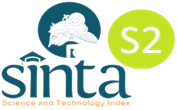Peningkatan Motivasi Dan Hasil Belajar Siswa Melalui Penerapan Model Pembelajaran Co-Op Co-Op
DOI:
https://doi.org/10.33477/bs.v11i1.2785Abstract
Biology learning carried out at SMPN 1 Air Buaya is indicated to be less effective because it is still teacher centered learning. This is indicated by the low motivation and student learning outcomes. One of the student-centered cooperative learning models is the co-op co-op type of learning model. This classroom action research aims to improve the motivation and learning outcomes of class VIII students through the application of the co-op co-op learning model on the respiratory system material in humans. This research is carried out in 2 cycles, where each cycle goes through the stages of planning, implementing, observing, and reflecting. The results showed that the co-op co-op learning model was able to improve student learning outcomes, namely as many as 89.4% of students and the average achievement of student motivation was 82.7%. Referring to the results of the study, classroom teachers should be more intensive in applying the co-op co-op learning model to other biology learning subjects.
Keywords: co-op co-op, biology learning, motivation, learning outcomes
References
Anggareni, N. W., Ristiati, N. P., & Widiyanti, N. (2013). Implementasi strategi pembelajaran inkuiri terhadap kemampuan berpikir kritis dan pemahaman konsep IPA siswa SMP. Jurnal Pendidikan Dan Pembelajaran IPA Indonesia, 3(1), 12–19.
Arikunto, S. (2006). Prosedur penelitian suatu pendekatan praktik. Jakarta: Rineka Cipta.
Arini, A., & Umami, H. (2019). Pengembangan Pembelajaran Pendidikan Agama Islam Melalui Pembelajaran Konstruktivistik Dan Sosiokultural. Indonesian Journal of Islamic Education Studies (IJIES), 2(2), 104–114.
Brush, T., & Saye, J. (2000). Implementation and evaluation of a student-centered learning unit: A case study. Educational Technology Research and Development, 48(3), 79–100.
Buntu, A., Ramadhan, A., & Tangge, L. N. (2017). Pengaruh model pembelajaran kooperatif mind mapping dan motivasi belajar terhadap hasil belajar siswa tentang biologi di kelas IX SMP Negeri 6 Palu. Mitra Sains, 5(2), 19–28.
Henri. (2018). Pengaruh model co-op co-op mandiri terhadap kemampuan pemecahan masalah ditinjau dari gaya belajar siswa. AKSIOMA: Jurnal Program Studi Pendidikan Matematika, 7(3), 482–491.
Latukau, R. F., & Wattimury, F. (2021). KOMPARASI ANTARA PENERAPAN MODEL PEMBELAJARAN KOOPERATIF TIPE TPS DAN TIPE TSTS BERDASARKAN GAYA KOGNITIF SISWA KELAS VIII SMP NEGERI 3 LEIHITU. Biosel: Biology Science and Education, 10(1), 41–54.
Laz, H. A., & Shafei, K. E. (2014). The effectiveness of constructivist learning model in the teaching of mathematics. Journal of Applied and Industrial Sciences, 2(3), 106–109.
Mahuda, I. (2017). Pembelajaran Kooperatif Co-Op Co-Op Dengan Pendekatan Open-Ended Untuk Meningkatkan Kemampuan Pemecahan Masalah Matematis Siswa SMA. JPPM (Jurnal Penelitian Dan Pembelajaran Matematika), 10(2), 31–39.
Mansur, S. (2018). Penerapan Model Pembelajaran Kooperatif Tipe STAD untuk Meningkatkan Motivasi dan Hasil Belajar Siswa pada Konsep Ekosistem di SMA Negeri 2 Maumere. Jurnal Al-Mutaaliyah: Jurnal Pendidikan Guru Madrasah Ibtidaiyah, 3(1), 117–127.
Maryanti, S. (2018). Model pembelajaran kooperatif co-op co-op dengan pendekatan predict-observe-explain untuk meningkatkan kemampuan pemecahan masalah matematis. Desimal: Jurnal Matematika, 1(3), 293–302.
Mulyasa, E. (2010). Penelitian tindakan kelas. Bandung: Remaja Rosdakarya.
Mulyono. (2021). Peranan Metode Demonstrasi Dalam Kegiatan Belajar Mengajar (KBM) Dalam Meningkatkan Minat Dan Prestasi Belajar Terhadap Mata Pelajaran IPA Pada Siswa Kelas VI Semester I SDN 2 Siwalan Kecamatan Mlarak Kabupaten Ponorogo Tahun Pelajaran 2013/2014. Jurnal Ilmiah Pengembangan Pendidikan (JIPP), 8(1), 1–7.
Overby, K. (2011). Student-centered learning. Essai, 9(1), 32.
Parendrarti, R. (2009). Aplikasi Model Pembelajaran Kooperatif Tipe TGT (Teams-Games-Tournament) Dalam Meningkatkan Motivasi dan Hasil Belajar Biologi Siswa Kelas XI IPA SMA Muhammadiyah 2 Surakarta Tahun Ajaran 2008/2009. Universitas Muhammadiyah Surakarta Perpustakaan.
Prasetya, S. P. (2014). Memfasiltasi pembelajaran berpusat pada siswa. Jurnal Geografi, 12(1), 1–12.
Pujiastuti, P., Kawuryan, S. P., & Ambarwati, U. (2017). Evaluasi pembelajaran tematik di sekolah dasar. Jurnal Kependidikan, 1(2), 187–199.
Qurohman, M. T. (2017). Meningkatkan kemampuan pemecahan masalah kalkulus lanjut melalui pembelajaran kooperatif tipe co-op co-op. Cakrawala: Jurnal Pendidikan, 11(1), 32–37.
Rosalina, S. M., Indrawati, I., & Mahardika, I. K. (2017). Model Pembelajaran Kooperatif Tipe Co-op Co-op Dalam Pembelajaran Fisika Siswa SMA. Jurnal Pembelajaran Fisika, 5(2), 162–169.
Satriani, I., Emilia, E., & Gunawan, M. H. (2012). Contextual teaching and learning approach to teaching writing. Indonesian Journal of Applied Linguistics, 2(1), 10–22.
Slavin, R. E. (2005). Cooperative learning teori, riset dan praktik. Bandung: Nusa Media.
Tari, D. K., & Rosana, D. (2019). Contextual teaching and learning to develop critical thinking and practical skills. Journal of Physics: Conference Series, 1233(1), 12102. IOP Publishing.
Yusri, Y., & Arifin, S. (2018). Desain pembelajaran kooperatif berbasis teori bruner untuk meningkatkan kualitas pembelajaran matematika. Histogram, 2(2), 147–158.
Downloads
Published
Issue
Section
License
Authors who publish with this journal agree to the following terms: Authors retain copyright and grant the journal right of first publication with the work simultaneously licensed under a Creative Commons Attribution License that allows others to share the work with an acknowledgement of the work's authorship and initial publication in this journal. Authors are able to enter into separate, additional contractual arrangements for the non-exclusive distribution of the journal's published version of the work (e.g., post it to an institutional repository or publish it in a book), with an acknowledgement of its initial publication in this journal. Authors are permitted and encouraged to post their work online (e.g., in institutional repositories or on their website) prior to and during the submission process, as it can lead to productive exchanges, as well as earlier and greater citation of published work.














